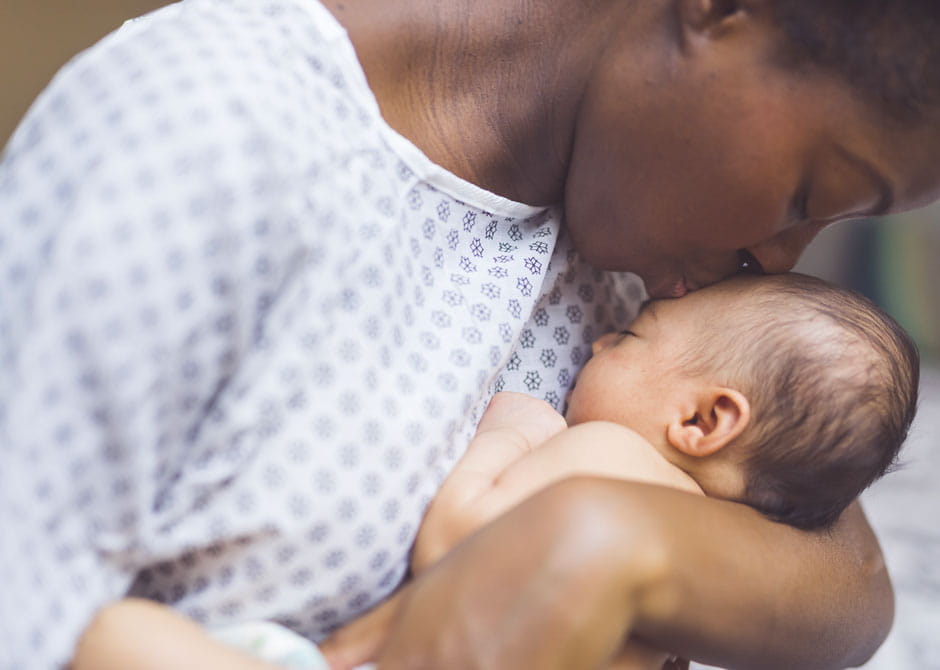
Lisa Christian, PhD
- Clinical Health Psychologist
Director of the Stress, Behavioral Immunology and Health Disparities Lab
 Being pregnant and having a baby can be an exciting time, but it’s important to recognize all the varying emotions that can come with a newborn. The perinatal (having to do with childbirth) time in a woman's life is a sensitive one.
Being pregnant and having a baby can be an exciting time, but it’s important to recognize all the varying emotions that can come with a newborn. The perinatal (having to do with childbirth) time in a woman's life is a sensitive one.
It’s normal and common for women who are new mothers to feel apprehension, have some mood swings and be overwhelmed in the days following childbirth, but sometimes those symptoms become too much and begin impacting their ability to take care of the baby, function in daily living or enjoy life.
If you or a loved one might be experiencing a perinatal mood or anxiety disorder, such as postpartum depression or postpartum anxiety, the Women’s Behavioral Health experts at The Ohio State University Wexner Medical Center in Columbus, Ohio, want you to know you don’t have to suffer alone and that there are effective, evidence-based treatments to help you feel better.
We’re a leader in not only identifying and treating perinatal mental health conditions, but we’re one of the only academic health centers in the country actively researching better ways to prevent postpartum issues, serve pregnant and postpartum women. You’ll be in good hands with our maternal behavioral health specialists.
Perinatal depression is depression that begins during pregnancy or in the period following childbirth. Depression that develops after childbirth is called postpartum depression.
Postpartum depression is different from “baby blues,” which are mild symptoms of sadness, mood swings, crying and anxiety that many women experience in the days following childbirth. These usually subside in a week or two. When they don’t or they’re more severe, it could be postpartum depression.
Postpartum depression affects about 15% of women who have given birth, and it requires medical help to treat.
A more serious form of postpartum mood disorder is called postpartum psychosis, which causes delusions and hallucinations. It’s a psychiatric emergency and can require hospitalization.
If you have thoughts of harming yourself or someone else, or are in emotional distress, please call 911 or text the Suicide and Crisis Lifeline at 988.
Postpartum depression can last for months or years, but if it’s treated by a mental health professional, that time can be much less.
Postpartum anxiety is anxiety or excessive worrying that begins after having a child. It’s normal to have some worry after bringing home a new baby, but when those thoughts, often intrusive or irrational, become all-consuming, affecting your ability to sleep or care for yourself or your baby, you could have postpartum anxiety.
Roughly 15% of people who give birth experience postpartum anxiety. While the condition shares many symptoms with postpartum depression, it is a different perinatal mental health disorder.
Postpartum anxiety can last for months or longer, especially if you have a history of anxiety disorders. Treatment can help reduce recovery time significantly.
There is no single definitive cause of these postpartum conditions, but they generally happen for a combination of reasons related to genetics, hormonal shifts and physical changes, and environment issues.

While perinatal mental health conditions are common, there are certain risk factors that can increase your chance of developing one of these disorders.
Some risk factors include:
It’s important to remember that just because you have some of these risk factors, doesn’t mean you’ll develop postpartum depression or anxiety.
Symptoms for postpartum depression or anxiety can often overlap, and they can start during pregnancy or in the weeks or months following childbirth. Also, not everyone experiences these conditions in the same way. It’s important to recognize the signs of these perinatal conditions, since early intervention and mental health treatment can lead to faster recovery times.
When depression begins during pregnancy, symptoms include:
When depression begins after you give birth, symptoms include:
Some symptoms that are unique to postpartum anxiety include:
Postpartum psychosis is a medical emergency. Call 911 or go to the nearest Emergency Department if you or a loved one has symptoms and could harm the baby or others.
Many women experience mild symptoms of sadness, feeling overwhelmed, difficulty sleeping or anxiousness following childbirth. These negative emotions are often referred to as “baby blues” and go away on their own after a couple of weeks.
When they don’t subside or they begin to interfere with your ability to take care of your baby or yourself, you might need to see a doctor for postpartum depression. Those with postpartum depression feel better more quickly when they receive medical treatment.

Postpartum depression or postpartum anxiety can affect anyone who’s recently given birth. It’s not entirely preventable, but there are steps to take to decrease your risk of developing mental health conditions postpartum, or to lessen the severity of symptoms if you do. We offer an educational skills group that has been shown to significantly reduce the risk of postpartum depression and anxiety.
Actions that can help reduce the impacts of postpartum depression and anxiety include:
At Women’s Behavioral Health at the Ohio State Wexner Medical Center, we specialize in identifying and treating mental health conditions during pregnancy and postpartum. Because we’re one of only a few university centers in the country providing clinical care and conducting research to better inform that care, we’re able to provide the most innovative and productive therapies to get you back to enjoying your life and family.
Our comprehensive treatment planning, which often involves a combination of group prevention education, medication and psychotherapy (talk therapy), is tailored to the individual, always striving for the best outcomes for new parents and their baby.
If you know someone with a postpartum mood disorder, it can be difficult to know the best ways to help. Here are some tips: